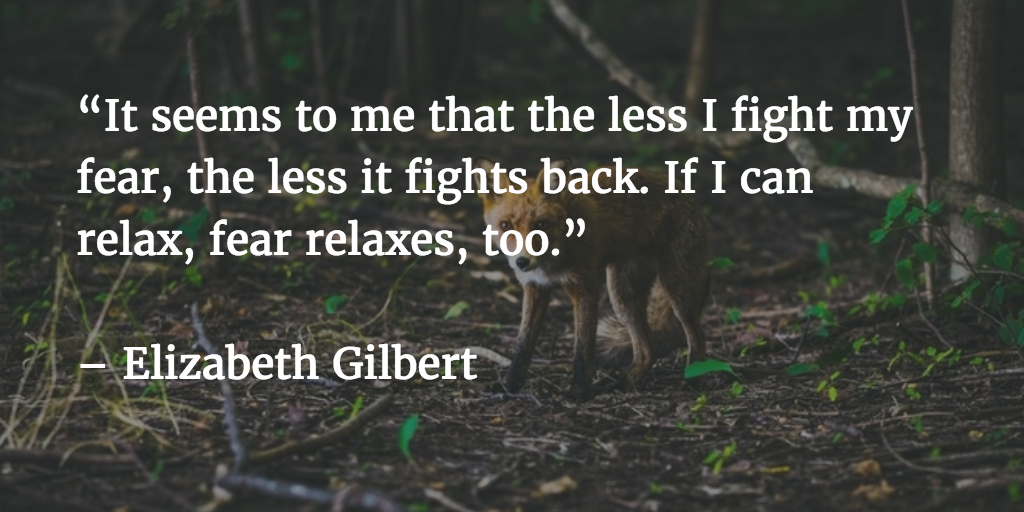Favorite quote from the author:

Audio Summary
Listen to the audio of this summary with a free reading.fm account:
Elizabeth Gilbert is best known for publishing the international bestseller Eat, Pray, Love in 2006, which was turned into a movie with Julia Roberts in 2010.
Eat, Pray, Love is Gilbert’s memoir of the year she spent traveling the world after getting a divorce, where she focused on food in Italy, found her spirituality in India and ultimately fell in love again in Bali. The book spent almost 200 weeks on The New York Times bestseller list. Big Magic is a non-fiction book, that describes her creative process.
It’ll teach you how to be creative in spite of your fears, how ideas work, where creativity comes from, and how you can make sure your creativity keeps flowing freely.
Here are 3 lessons to get you started:
- Let your fears coexist with your passions.
- Give yourself permission to create.
- Keep your day job to fuel your creative affair.
Lesson 1: Let your fears coexist with your passions.
There’s a lot of talk out there these days that you “have to overcome your fears.” As if somehow, you could do something, and that would magically make them go away forever. That’s not the case. Steven Pressfield has shown us that artists who truly care will always have to face their fears, even long after they’ve become huge successes.
Elizabeth Gilbert agrees. She says instead of overcoming your fears, just get comfortable with them. Let your curiosity take the wheel, and put your fears into the backseat. They’re more than welcome to join the ride and give feedback, but you won’t take any detours because of them, nor let them take the wheel. Your fears are supposed to stay around and remind you of the things that are important to you. Nothing more, nothing less.
So, learn to let your fears and passions coexist, and it’ll help you move on and write the next page, take the next stroke with your painting brush or record the next karaoke video – no matter what anyone thinks, including you.
Lesson 2: Give yourself permission to create, even if you start at zero.
The thought “I’m going to start a daily blog” sounds great in your head – for about 12 seconds. Then the fears and doubts kick in.
“You’ll run out of things to say after a week.” “You don’t have the discipline to publish daily.” “You’ll produce a ton of crap.”
Ahh, self-talk, where would we be without it? This little conversation is one I had in my own head before starting this very site. But I went ahead and gave myself permission to do it anyway.
Sure, the first summaries on here aren’t nearly as good as some of the newer ones, but being okay with producing something that’s not as good is exactly what I needed to do before I was able to get here in the first place.
You have a right to create. No matter where you’re starting from. Whether you have always had a talent, or start at absolute zero. Tell yourself that. Say it out loud.
“I’m a writer.”
“I’m a painter.”
“I’m a singer.”
Announce to yourself and the world that you’re here to chase your passion, regardless of rejections and reactions. Being authentic is much more important than being original and the latter always follows the former eventually, so don’t worry too much starting out and just get going.
Lesson 3: Keep your day job to fuel your love affair with creativity.
We all know that one hipster guy or girl from high school, who’d spent his or her entire time writing songs and playing the guitar and now plays the bi-weekly show at a local pub, but never got a real job.
That’s the cliché version of “an artist’s life” and it’d best stay that, because it often chokes your creativity, due to the stress of having to pay your bills with your art.
Imagine having to sing every day at a place you don’t like for people you don’t care about. After you come home to your tiny broom closet of an apartment, would you still have the energy to create more? Probably not.
Elizabeth Gilbert suggests an often critiqued, but incredibly stress-free approach: Keep your day job, and let it fuel your creative affair. Having a day job that pays the bills, that’s not necessarily related to your art, will give you the safety and freedom to practice your creative art guilt-free.
Imagine having an affair with writing, for example. Every day after work, you could lock yourself up in your room and write away, free from worry about paying the bills or where to get the next client.
Nobody can guarantee you that you’ll be successful, and forcing yourself to create something that’ll make you famous and wealthy fast will suck all the fun out of creating. How can you possibly create your best work like that?















 />
/>








































